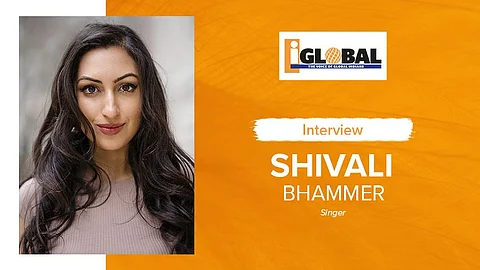

Shivali Bhammer, a British Indian musician who first launched ‘The Bhajan Project’ 10 years ago, is back with a follow up album to the widely successful compilation with fresh and innovative renditions of devotional music.
‘The Bhajan Project 2’ is crafted as a contemporary expression of spirituality with a collection of the most popular bhajans and familiar mantras which Shivali herself has grown up to. Blending an eclectic mix of beats and sounds from the genres of R&B, soul, rock and pop, every bhajan is designed to touch the soul. Her albums are produced by her rakhi brother, producer and singer song-writer Arjun Coomaraswamy.
In this interview with iGlobal, Shivali shares her many highlights from the new album, the inspiration behind the melodies and motivation behind popularising bhajans worldwide.
What are the highlights for you from ‘The Bhajan Project 2’?
The Aarti Om Jai Jagdish Hare – I am really happy with the tone, production and devotion in that track. We deliberately created pauses to add depth and texture to the song and you feel it coming through.
I also like the Mahamrityunjaya Mantra because it was challenging to produce. We have a style that is contemporary and urban, but it is one of the most powerful and important mantras, so we had to get it right. I injected my Kathak bol into it, since Lord Shiva is the Lord of Dance, and it created a completely new dimension to the mantra.
Do you feel your albums have made bhajans more accessible to a wider audience base?
I would hope so – that was definitely the intention. I get a lot of messages from people from random places like Brazil, or South Korea as well as places that have a huge Hindu audience such as the US and UK.
When you grow up outside of India, you want to connect to your roots in a way that you can recognise and is easy – I think that's what our bhajans do.
How do you see the role of devotional music evolving within a diaspora audience since the first album?
I think I was the pioneer in the space, and since then we have had many people get involved in making bhajans that represent their music style and I think that is great. My personal role is to represent devotional music authentically, and hopefully people can apply that devotion to their mindset and outlook in life for a joyful existence.
MORE LIKE THIS…
Your video is shot at a very iconic location in the UK; please tell us more.
Yes, it is at the Hare Krishna Temple in Watford known as Bhaktivedanta Manor, which was gifted to ISKCON by a member of the Beatles, George Harrison. I think it's beautiful that it came to ISKCON through a musician, and now I sing bhajans there. The temple is a home to Hindus in London, it is a place where the doors are always open.
MORE LIKE THIS…
And, your personal favourites from the album, the ones you find yourself humming all the time?
Radhe Radhe and Payoji Maine. I am a romantic, and both are deeply romantic in their spiritual message. It fills my heart on a cold grey day in London.
*Info: Shivali Bhammer